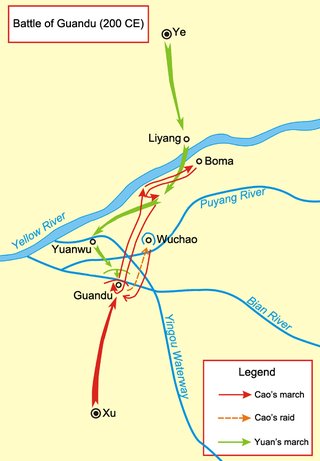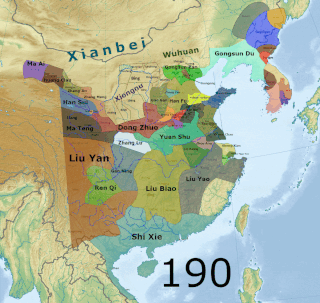
Xiahou Dun,courtesy name Yuanrang,was a Chinese military general and politician serving under the warlord Cao Cao during the late Eastern Han dynasty of China. He served for a few months under Cao Cao's successor,Cao Pi,before his death. As one of Cao Cao's most trusted generals,Xiahou Dun aided the warlord in his campaigns against LüBu,Liu Bei,Sun Quan and others.

Sun Ce,courtesy name Bofu,was a Chinese military general,politician,and warlord who lived during the late Eastern Han dynasty of China. He was the eldest child of Sun Jian,who was killed during the Battle of Xiangyang when Sun Ce was only 16. Sun Ce then broke away from his father's overlord,Yuan Shu,and headed to the Jiangdong region in southern China to establish his own power base there. With the help of several people,such as Zhang Zhao and Zhou Yu,Sun Ce managed to lay down the foundation of the state of Eastern Wu during the Three Kingdoms period.

The Battle of Guandu was fought between the warlords Cao Cao and Yuan Shao in 200 AD in the late Eastern Han dynasty. Cao Cao's decisive victory against Yuan Shao's numerically superior forces marked the turning point in their war. The victory was also the point at which Cao Cao became the dominant power in northern China,leading to the establishment of the state of Cao Wei in the Three Kingdoms period.

Xu Huang,courtesy name Gongming,was a Chinese military general serving under the warlord Cao Cao in the late Eastern Han dynasty of China. He later served in the state of Cao Wei during the Three Kingdoms period under the first two rulers,Cao Pi and Cao Rui,before his death at the start of Cao Rui's reign. Xu Huang is best noted for breaking the siege at the Battle of Fancheng in 219 by routing the enemy commander Guan Yu on the field.

Yuan Shao,courtesy name Benchu (本初),was a Chinese military general,politician,and warlord who lived in the late Eastern Han dynasty. He occupied the northern territories of China during the civil wars that occurred towards the end of the Han dynasty. He was also an elder half-brother of Yuan Shu,a warlord who controlled the Huai River region,though the two were not on good terms with each other.

Yan Liang was a military general serving under the warlord Yuan Shao during the late Eastern Han dynasty of China. He was slain by Guan Yu at the Battle of Boma.
Chunyu Qiong,courtesy name Zhongjian,was a military officer serving under the warlord Yuan Shao during the late Eastern Han dynasty of China. He played a significant part in the Battle of Guandu in 200.

The military history of the Three Kingdoms period encompasses roughly a century's worth of prolonged warfare and disorder in Chinese history. After the assassination of General-in-chief He Jin in September 189,the administrative structures of the Han government became increasingly irrelevant. By the time of death of Cao Cao,the most successful warlord of North China,in 220,the Han empire was divided between the three rival states of Cao Wei,Shu Han and Eastern Wu. Due to the ensuing turmoil,the competing powers of the Three Kingdoms era found no shortage of willing recruits for their armies,although press-ganging as well as forcible enlistment of prisoners from defeated armies still occurred. Following four centuries of rule under the Han dynasty,the Three Kingdoms brought about a new era of conflict in China that shifted institutions in favor of a more permanent and selective system of military recruitment. This ultimately included the creation of a hereditary military class as well as increasing reliance on non-Chinese cavalry forces and the end of universal conscription.

Yue Jin,courtesy name Wenqian,was a military general serving under the warlord Cao Cao in the late Eastern Han dynasty of China. He was noted as much for his short stature as for his valour and ferocity on the battlefield. Yue Jin participated in most of Cao Cao's early military exploits,and gained multiple successes in the campaigns against LüBu,Liu Bei,remnants of the Yellow Turban rebels,and Yuan Shao and his associates. He was particularly praised as a capable vanguard,but his most famed accomplishment came with his supporting role in the defence of Hefei against Sun Quan's forces at the Battle of Xiaoyao Ford of 214–215.

The end of the Han dynasty was the period of Chinese history from 189 to 220 CE,roughly coinciding with the tumultuous reign of the Han dynasty's last ruler,Emperor Xian. It was followed by the Three Kingdoms era. During the end of the Han dynasty,the country was thrown into turmoil by the Yellow Turban Rebellion (184–205). Meanwhile,the Han Empire's institutions were destroyed by the warlord Dong Zhuo and fractured into regional regimes ruled by various warlords,some of whom were nobles and officials of the Han imperial court. The warlord Cao Cao took control of Emperor Xian and his court in 196 and began gradually reunifying the empire. Cao Cao ostensibly operated under Emperor Xian's rule,though in reality the emperor was a hostage.

Ju Shou was an adviser serving under the warlord Yuan Shao during the late Eastern Han dynasty of China.
Zhang Yan,born Chu Yan,also known as Zhang Feiyan,was the leader of the Heishan bandits during the late Eastern Han dynasty of China. He rose from a local rebel to master of a confederation that could hold off the Han,becoming a regional power,and was able to maintain authority in Changshan until he chose to surrender to Cao Cao,getting enfeoffment that remained with his family.
The Battle of Xiapi was fought between the forces of LüBu against the allied armies of Cao Cao and Liu Bei from the winter of 198 to 7 February 199 towards the end of the Eastern Han dynasty in China. The battle concluded with victory for Cao Cao and Liu Bei,with LüBu being subsequently executed.
The Battle of Xingyang was fought in 190 in the late Eastern Han dynasty as part of the campaign against Dong Zhuo. It took place when Dong Zhuo's retreating forces,led by Xu Rong,encountered the pursuing armies of Cao Cao at Xingyang. The battle ended in a victory for Dong Zhuo's forces,with Cao Cao being forced to retreat.
The Battle of Boma or Battle of Baima was the first of a series of battles that led to the decisive Battle of Guandu between the warlords Yuan Shao and Cao Cao in northern China in the late Eastern Han dynasty of China. Although Cao Cao won the battle and Yuan Shao lost his elite general Yan Liang,Cao eventually abandoned his position in Boma to entrench at the strategically important Guandu.
The Battle of Yan Ford took place along the southern banks of the Yellow River in the late Eastern Han dynasty. The battle was closely preceded by the Battle of Boma,and was part of a series of engagements leading to the decisive confrontation between the rival warlords Yuan Shao and Cao Cao at the Battle of Guandu in 200. Following the death of one of Yuan Shao's elite generals,Yan Liang,in the previous battle,the death of another famed general Wen Chou in this battle greatly demoralised Yuan's army,which was heading towards Guandu.
The Battle of Dushi Ford was fought between the warlords Cao Cao and Yuan Shao between 3 February and 2 March 200 in the late Eastern Han dynasty. In the battle,Yuan Shao launched an attack on Cao Cao's position on the southern bank of the Yellow River,taking advantage of Cao's temporary absence. In response,Cao Cao's general Yu Jin raided Yuan Shao's encampments in the vicinity of present-day Henan,ultimately discouraging Yuan from making a determined attack.
The Battle of White Wolf Mountain was fought in 207 in the late Eastern Han dynasty of China,preceding the Three Kingdoms period. The battle took place in northern China,beyond the frontiers of the ruling Eastern Han dynasty. It was fought between the warlord Cao Cao and the nomadic Wuhuan tribes,who were allied with Cao Cao's rivals Yuan Shang and Yuan Xi. The victory attained by Cao Cao dashed the hopes of a Wuhuan dominion,and the Wuhuan eventually became weakened,lost importance,and were gradually absorbed into the Han population or the Xianbei tribes.
The Battle of Liyang,fought between October 202 and June 203 in the late Eastern Han dynasty,was an invasion attempt by the warlord Cao Cao against the brothers Yuan Shang and Yuan Tan,the sons of Cao's rival Yuan Shao. The battle in October 202 was the first between the two factions since the death of Yuan Shao four months earlier. Although it ended in Cao Cao's withdrawal,events in this battle brought tensions between the Yuan brothers to the surface as Yuan Tan mutinied against his younger brother Yuan Shang after Cao Cao's temporary exit from the scene.
Shi Huan,courtesy name Gongliu,gained a reputation for valour and loyalty comparable to Han Hao. Shi Huan served the Eastern Han dynasty warlord Cao Cao from early on and was a trusted figure who helped supervise officials.










